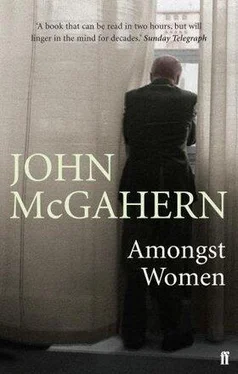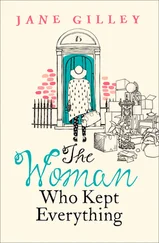John McGahern - Amongst Women
Здесь есть возможность читать онлайн «John McGahern - Amongst Women» весь текст электронной книги совершенно бесплатно (целиком полную версию без сокращений). В некоторых случаях можно слушать аудио, скачать через торрент в формате fb2 и присутствует краткое содержание. Год выпуска: 2008, Издательство: Faber & Faber, Жанр: Современная проза, на английском языке. Описание произведения, (предисловие) а так же отзывы посетителей доступны на портале библиотеки ЛибКат.
- Название:Amongst Women
- Автор:
- Издательство:Faber & Faber
- Жанр:
- Год:2008
- ISBN:нет данных
- Рейтинг книги:5 / 5. Голосов: 1
-
Избранное:Добавить в избранное
- Отзывы:
-
Ваша оценка:
- 100
- 1
- 2
- 3
- 4
- 5
Amongst Women: краткое содержание, описание и аннотация
Предлагаем к чтению аннотацию, описание, краткое содержание или предисловие (зависит от того, что написал сам автор книги «Amongst Women»). Если вы не нашли необходимую информацию о книге — напишите в комментариях, мы постараемся отыскать её.
Amongst Women — читать онлайн бесплатно полную книгу (весь текст) целиком
Ниже представлен текст книги, разбитый по страницам. Система сохранения места последней прочитанной страницы, позволяет с удобством читать онлайн бесплатно книгу «Amongst Women», без необходимости каждый раз заново искать на чём Вы остановились. Поставьте закладку, и сможете в любой момент перейти на страницу, на которой закончили чтение.
Интервал:
Закладка:
‘I was thinking of taking it,’ Moran admitted.
‘Wouldn’t it buy something for the girls here or put someone through school even if you didn’t want to take it for yourself? You should have taken it years ago. In this world you don’t exist without money. And there might never be another world.’ McQuaid could not resist this hit at Moran’s religiosity.
‘Man proposes …’ Moran said darkly.
‘And God stays out of it,’ McQuaid twisted round the old saw.
The girls had washed and put away the cups and plates, covered the few squares of sandwiches that remained with a damp cloth. ‘Mr McQuaid’s room is ready,’ Maggie said as they prepared to take their leave for the night. ‘The bed is aired.’
‘Oh, I forgot,’ McQuaid said hastily. ‘I have to be hitting the road any minute now. I should have told you earlier but it must have slipped the old mind.’
Moran did not protest. Covertly, leaning far back in his chair, he watched McQuaid from under hooded eyelids: in all the years they had been coming together on Monaghan Day McQuaid had always spent the night in the house.
‘I told my old lady I’d be home,’ McQuaid lied as he rose. ‘Otherwise she’d have gone over to one of the boys. She gets afraid on her own in the house at night.’
Having waited long enough to see if they were needed, the two girls went up to Moran and kissed him on the lips as they did every night.
‘Good night, Mr McQuaid,’ they offered their hand.
‘That was a great meal. Ye are a great pair of girls. If you ever get up our way call in to see my old lassie,’ he took and held their hands.
‘Good night, Mr McQuaid,’ they repeated awkwardly before leaving the two men alone.
McQuaid sat down but almost immediately rose again. As on all the other Monaghan Days stretching far back he had come intending to stay the night. Tonight a growing irritation at Moran’s compulsion to dominate, to have everything on his own terms or not at all, had hardened into a sudden decision to overturn the years and quit the house at once. As soon as Moran saw McQuaid on his feet again he knew the evening, all the evenings, were about to be broken up and he withdrew back into himself. He would neither plead with him to stay nor help him with his leaving.
As soon as McQuaid met Moran’s domination of the evening with this sudden violence he was anxious to be conciliatory. ‘Well, thanks for the meal and evening, Michael. It was a great evening.’
For a time it seemed that Moran might choose to remain seated and force McQuaid to make his own way out of the house. When he did rise in the chair it was slowly and grudgingly and he followed McQuaid out into the stone hallway as if he were finding it difficult to walk or move. He held his hand on the door’s edge in the darkness of the hallway.
‘Good luck, Michael,’ the old cattle dealer said a last time but Moran made no answer in the darkness.
A brief moon between clouds outside sharpened the lines of boxwood that led to the wooden gate. McQuaid walked heavily and firmly to the gate. He did not bother to shut it, letting it swing open behind him. After opening the door of the Mercedes he leaned on its edge to clear his throat and spit on the yellow path.
‘Some people just cannot bear to come in second,’ he said loudly enough to be heard before getting into the car, reversing it round and driving away. Moran stood holding the edge of the door until the headlights disappeared and he closed the door without shutting the iron gate at the road or the small wooden gate leaning against the boxwood.
In a cold fury he stood and sat about for a long time within, twice changing from chair to chair. After years he had lost his oldest and best friend but in a way he had always despised friendship; families were what mattered, more particularly that larger version of himself — his family; and while seated in the same scheming fury he saw each individual member gradually slipping away out of his reach. Yes, they would eventually all go. He would be alone. That he could not stand. He saw with bitter lucidity that he would marry Rose Brady now. As with so many things, no sooner had he taken the idea to himself than he began to resent it passionately.
McQuaid had either struck true by pure chance or had picked up reliable gossip at the Mohill Fair.
Rose Brady had come home from Glasgow to nurse her father and stayed on irresolutely after his death, one day stretching into days. She could go back to the Rosenblooms, to the big house outside Glasgow where she had lived as one of the family for twelve years. Mrs Rosenbloom had written that they all wanted her back but still she stayed with her mother and brother in the farmhouse above the small lake, the poor rock- strewn lower slopes of the mountain rising towards Arigna beyond.
Sometimes in the evenings she had too strong a sense of being locked into the life of the farmhouse, even with the door continuously open on the summer yard, her brother away in the fields, her mother stumbling about the place with buckets, leaning on the table or the back of a chair whenever she stood to talk. One evening, as an excuse to get out of the house, she went with a letter to the post office.
To her surprise the small room of the post office was full of people waiting for the evening mail. They all turned towards her when she entered and way was made for her to go up to the counter. People whose own names she was no long certain of called out her name and she smiled and nodded by way of general response. The post office was owned by two white- haired sisters, Annie and Lizzie, far out cousins of her own, and Annie stamped the envelope for her, postmarked it and dropped it in the calico bag on the counter.
‘You’re still with us, Rose?’
‘Still here, Annie. You’ve a big crowd this evening.’
‘It’s for the mail van. You might as well wait yourself to see if there’s anything for the house.’
In turn she moved aside to allow someone else room at the counter and found herself standing beside Mcran. She knew him well by sight but she had never spoken with him before.
‘I was very sorry about your father,’ he said.
‘I know that,’ she gave the formal response.
He had been a widower for many years, she knew. He had been an army officer once and there had been trouble that caused him to leave the army. Often she had passed the stone house where he lived with his children, some of whom must now be grown. She had heard dark mutterings about him but after a few minutes of talking with him she was ready to put it down to common envy. She found him attentive, intelligent, even charming, but with a distinct sense of separateness and pride that she found refreshingly unlike any of the other local men she had known. When the mail van pulled up outside, the hum of talk about them went silent. The driver dumped the mail bag on the counter, lifting the sealed bag without speaking a word. Annie opened the bag. As soon as she started to go through the bundle of letters, all Moran’s attention was fixed on the sorting. He ignored Rose completely. From being the centre of his attention one moment all of a sudden she ceased to exist. His whole life seemed to hang on each letter in Annie’s hand, his eyes following it until she handed it into the crowd or placed it on a pile to one side and then he would fix on the next letter and the next. The tension was such that she felt sudden relief as they went out of the small room into the air.
‘Were you expecting an important letter?’
‘No,’ he laughed. ‘What makes you think that?’
‘Oh, I just wondered.’
‘I come nearly every evening for the post. It gets you out of the place. It saves wondering the next day whether Jimmy Lynch will bring anything to the house or not.’
Читать дальшеИнтервал:
Закладка:
Похожие книги на «Amongst Women»
Представляем Вашему вниманию похожие книги на «Amongst Women» списком для выбора. Мы отобрали схожую по названию и смыслу литературу в надежде предоставить читателям больше вариантов отыскать новые, интересные, ещё непрочитанные произведения.
Обсуждение, отзывы о книге «Amongst Women» и просто собственные мнения читателей. Оставьте ваши комментарии, напишите, что Вы думаете о произведении, его смысле или главных героях. Укажите что конкретно понравилось, а что нет, и почему Вы так считаете.












